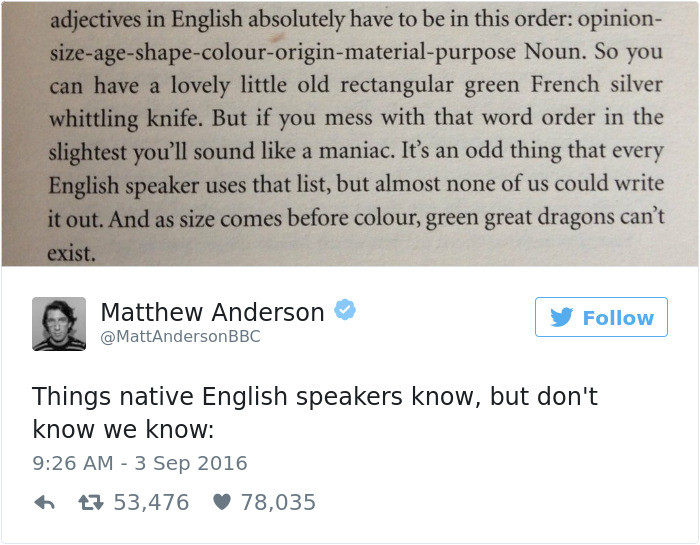Hello ladies and gents this is the Viking telling you that today we are talking about
Weirdest Things About The English Language
English is hard. English is a baffling language to learn. And without the trials and tribulations of people who had to learn English as a second language, us native speakers would probably never realize the true extent of its utter nonsense.
Perhaps you’ve seen this particular ode to English weirdness in an email chain your uncle forwarded to you, but it seems appropriate to recall right now that “you may find a lone mouse or a nest full of mice / yet the plural of house is houses, not hice.”
If you can write an entire poem devoted to confusing inconsistencies in plural noun forms and pronunciation, imagine what you can do with the rest of the language!
Here are nine weird quirks of the English language that make it one of the hardest languages for non-natives to learn.
1. Words that look like they should rhyme, but don’t (at all)
It’s perhaps one of the hallmarks of English that words can be spelled similarly with absolutely no guarantee of sharing a similar pronunciation. Think: cough, rough, though and through.
2. Words that look exactly the same, but with different meanings and pronunciations
There are some words (like “record”) that mean two completely different things when used as a noun versus a verb. And on top of that, we use different stress patterns when we say them out loud: “REcord” for your Dad’s old Beatles album, and “reCORD” for when you’re leaving a voicemail. Here’s a longer list of homonyms to add to your confusion.
3. Words that don’t sound like they look, because why should anything make sense
Exhibit A: “queue.” Because why not? Apparently, we have 16th century academics to thank for a lot of this, though. Words like “debt” and “doubt” inherited a “b” as a reminder that they came from the Latin debitum. A similar thing happened with “receipt.” But on top of this, some spellings were changed to match completely unrelated Latin words. The Old English “iland” became “island,” for example, as a nod to the Latin word insula.
4. That “i before e” rule leaves a lot to be desired
Almost everyone is familiar with “i before e, except after c, and except as in ‘neighbour’ and ‘weigh.'” It’s a rule that almost every English-learner is taught to make things “simpler.” But that doesn’t account for words like weird, heist, leisure, ancient, efficient, neither and conscience.
5. Some nouns have corresponding verbs, and others, well, don’t
“Why is it that writers write and painters paint, but fingers don’t fing? Why don’t grocers groce, why don’t hammers ham, and why don’t dumpsters dumpst?” — Author unknown
and as always have a chilled day from the Viking

Comments
Post a Comment